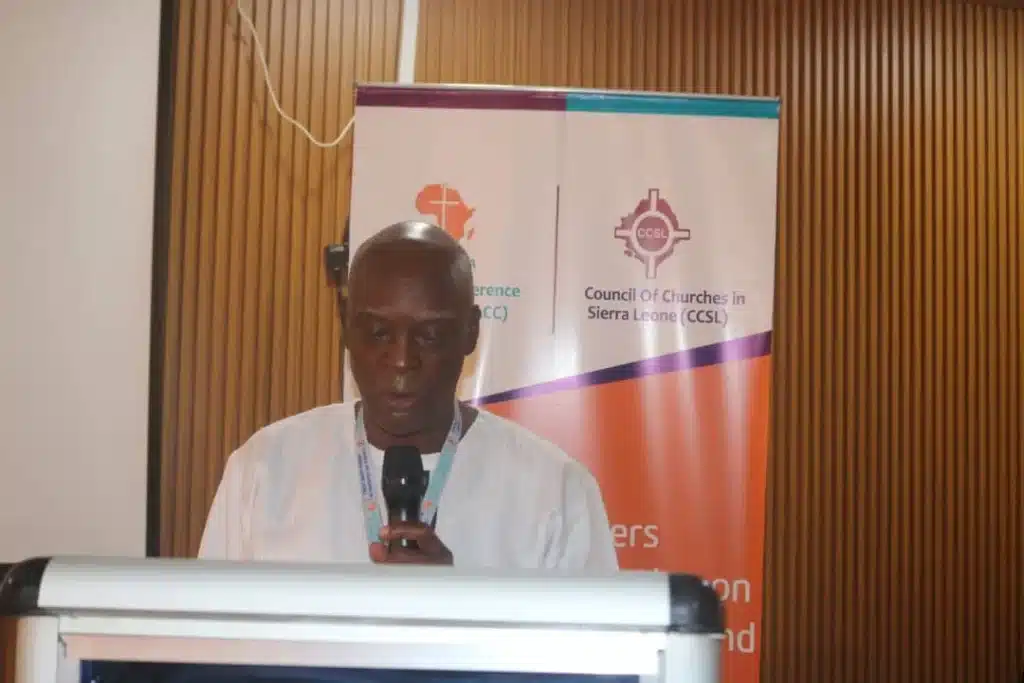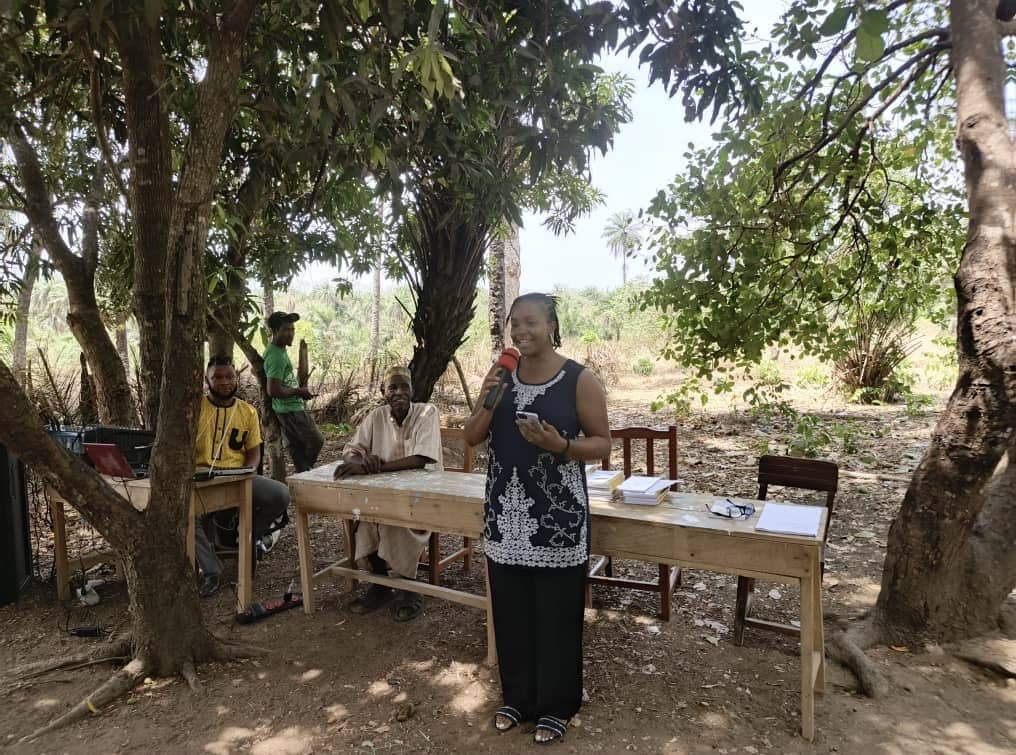OAIC Tree for Life Project
Click here to read the most recent update
Organization of African Instituted Churches (OAIC) is the representative body that brings together African Independent and Instituted Churches (AICs), offers them a forum for sharing their concerns and hopes, and enables churches to minister effectively to the needs of their members and their communities. There are about 60 million AIC members spread over tens of thousands of AIC denominations across Sub-Saharan Africa and the African Diaspora, and the international headquarters is located in Nairobi, Kenya.
Presently, East Africa, Southern Africa, and Nigeria are all experiencing droughts. These extreme weather patterns, due to climate change, affect everyone. However, it is having a greater impact on those living on the margins of society and rural areas. The impact of the drought in Kenya alone has resulted in a lack of food, a steep increase in the price of food due to the lack of food, and the loss of lives and livestock.
The Tree for Life is a sustainable agricultural project to plant tree nurseries and improve food security and income security in communities in Kenya and Nigeria. As a result, the Tree for Life project will protect, restore, and promote the sustainable use of terrestrial ecosystems, sustainably manage forests, and reverse land degradation and biodiversity loss. Primarily women, young people, and children in primary schools active in agricultural clubs are participating in the planting and nurturing of trees throughout Kenya and Nigeria. The planting of trees is accompanied by trainings, which encourage traditional knowledge on the effective care of trees and maintaining tree nurseries. While participants are active in farming activities and caring for the new tree nurseries, the OAIC is working with congregations as well to raise awareness on the effects of climate change.
The OAIC is raising funds to purchase seeds for three tree nurseries, offering trainings for local trainers and farmers, and developing and distributing educational materials on climate change.
Update: August 2018
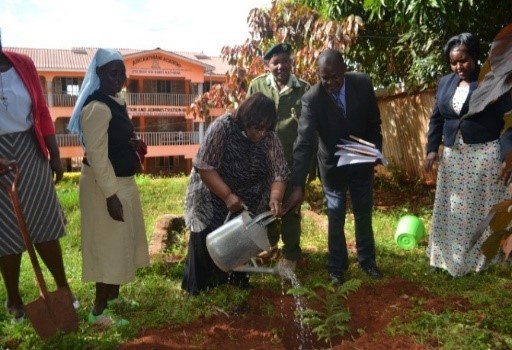 The Tree for Life is a sustainable agricultural project of the OAIC to plant tree nurseries and improve food security and income security in communities in Kenya and Nigeria. The project originated as a response to the extreme weather patterns, which is having the greatest impact on those living on the margins of society and in rural areas. In the past year, the OAIC has started implementing the project in Machakos County of Eastern Kenya. In Kenya, the Forestry Department recommends that each county have at least 10% of land covered in forest. Currently, only 3% of the land in Machakos County is considered forest. Machakos County is regularly in the news because of a lack of rain, cattle dying from the absence of green pastures, and crops failing because of drought.
The Tree for Life is a sustainable agricultural project of the OAIC to plant tree nurseries and improve food security and income security in communities in Kenya and Nigeria. The project originated as a response to the extreme weather patterns, which is having the greatest impact on those living on the margins of society and in rural areas. In the past year, the OAIC has started implementing the project in Machakos County of Eastern Kenya. In Kenya, the Forestry Department recommends that each county have at least 10% of land covered in forest. Currently, only 3% of the land in Machakos County is considered forest. Machakos County is regularly in the news because of a lack of rain, cattle dying from the absence of green pastures, and crops failing because of drought.
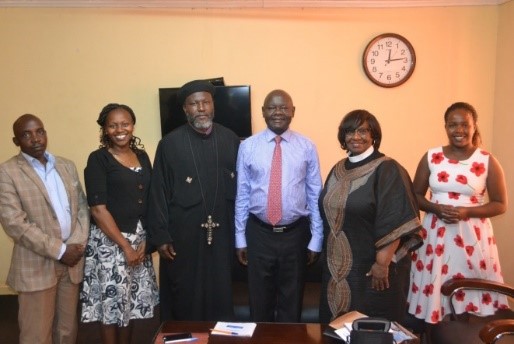 The OAIC is encouraged to see the motivation of political leaders in Machakos County to take environmental action. The Minister of Environment said, “Most people do not see planting trees as a priority in the midst of all other burning issues the country is facing. It is difficult for us to understand the connection between trees and human health, and trees and weather. We welcome the Tree for Life project and we are willing even to give land to the church so that they can plant a forest. The county needs more than 1,000 trees planted, and with the Tree for Life project, we plan to plant one million trees in Machakos alone.”
The OAIC is encouraged to see the motivation of political leaders in Machakos County to take environmental action. The Minister of Environment said, “Most people do not see planting trees as a priority in the midst of all other burning issues the country is facing. It is difficult for us to understand the connection between trees and human health, and trees and weather. We welcome the Tree for Life project and we are willing even to give land to the church so that they can plant a forest. The county needs more than 1,000 trees planted, and with the Tree for Life project, we plan to plant one million trees in Machakos alone.”
The project has become a part of the community fabric. Today, a partnership between the OAIC, Machakos County government, the national government, and the African Brotherhood Church is committed to the Tree for Life project. Together, this partnership has accomplished several goals for planting trees in Machakos County already.
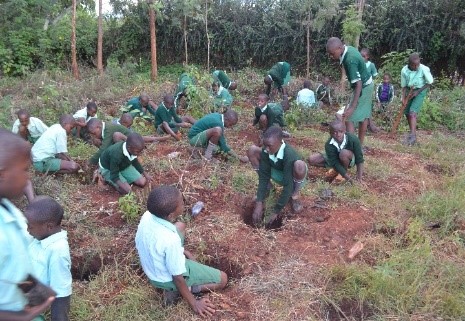 Since the project’s beginnings, the OAIC has planted an initial assortment of 200 seedlings at the Kathiani Primary School. The OAIC has trained a local congregation of the African Brotherhood Church (ABC) in afforestation. Also, the county government has given the OAIC an acre of land in Kathiani forest for this project. Moving forward, the Tree for Life project continues to work toward the remaining goals for Machakos county, including:
Since the project’s beginnings, the OAIC has planted an initial assortment of 200 seedlings at the Kathiani Primary School. The OAIC has trained a local congregation of the African Brotherhood Church (ABC) in afforestation. Also, the county government has given the OAIC an acre of land in Kathiani forest for this project. Moving forward, the Tree for Life project continues to work toward the remaining goals for Machakos county, including:
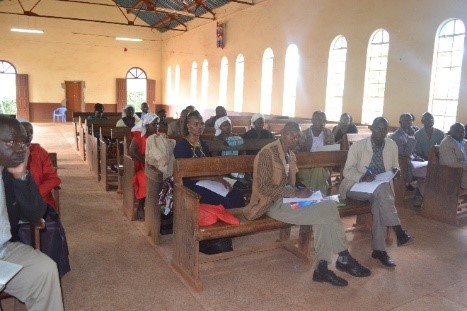 • Planting at least one million trees by March 2019
• Planting at least one million trees by March 2019
• Establishing tree nurseries at four congregations of the ABC church maintained for transplanting young trees in the forest
Global Ministries is grateful for the support received for the Tree for Life project of the Organization of African Instituted Churches, and continues to welcome gifts in support of this project.
Update: February 2020
Organization of African Instituted Churches (OAIC) is the representative body that brings together African Instituted Churches (AICs), and enables churches to minister effectively to the needs of their members and their communities. There are about 60 million AIC members spread over tens of thousands of AIC denominations across Sub-Saharan Africa and the African Diaspora, and the international headquarters are in Nairobi, Kenya.
The Tree for Life is a sustainable agricultural project to plant tree nurseries, improve food security, and income security in communities in Kenya and Nigeria. The OAIC works with the Forestry Department and Agricultural Schools of Universities to test the soil of potential tree planting locations to ensure maximum growth of trees planted and to determine if the soil must be treated prior to planting.
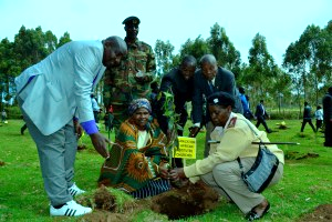 Working also with community members, churches, schools, and refugee camps, the OAIC is planting new fruit trees in communities across Kenya, Uganda, and Nigeria, and seeking solutions to reduce the number of trees being cut down. In many East African countries, communities of refugees rely on using firewood to cook meals, creating an increased environmental impact. The OAIC, through the Tree for Life project, has been distributing new biodigesters, which can convert organic waste matter into burnable fuel for cooking. This is a more hygienic method for cooking as opposed to cooking meals over firewood, which generates a lot of smoke that can be inhaled, and it helps reduce the number of trees being cut down at the same time.
Working also with community members, churches, schools, and refugee camps, the OAIC is planting new fruit trees in communities across Kenya, Uganda, and Nigeria, and seeking solutions to reduce the number of trees being cut down. In many East African countries, communities of refugees rely on using firewood to cook meals, creating an increased environmental impact. The OAIC, through the Tree for Life project, has been distributing new biodigesters, which can convert organic waste matter into burnable fuel for cooking. This is a more hygienic method for cooking as opposed to cooking meals over firewood, which generates a lot of smoke that can be inhaled, and it helps reduce the number of trees being cut down at the same time.
In the next year, the Tree for Life project is planting 15,000 trees in 16 new locations, which have been identified as priority regions for reforestation by the Forestry Department. Ten locations will have 1,000 trees planted at each location, and six locations will have 500 trees planted.
Update: June 2021
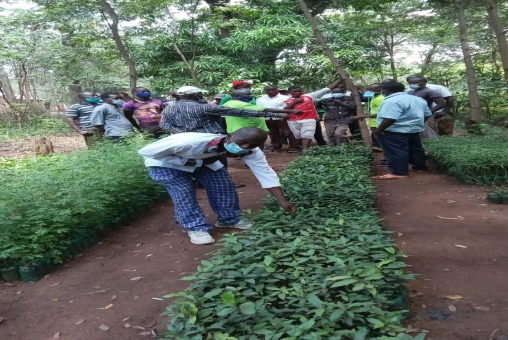
Tharaka Nithi
This area is located in a semi-arid zone with land available for sizeable farms to plant trees. A team of farmers’ leaders have focused on tree planting to restore vegetation around the few water sources available in the area. Additionally, the planting of trees is preventing soil erosion and the movement of silt into waterbodies. To date, 100 households have received and planted 1,350 trees for bearing fruits and improving soil fertility. The team is beginning to work with an additional 250 households in this region.
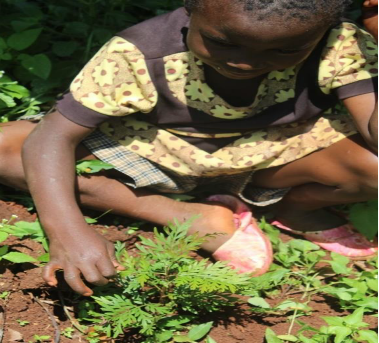
Vihiga County
The farmers’ leaders in this region are focusing on increasing the number of fruit trees, fodder trees to provide food for livestock, and trees to improve soil fertility. This region is densely populated, and there are smaller sizes of land for farming. Each family has fewer trees to plant and maintain, but there is high demand for fruit trees and fodder trees to feed livestock, both of which help improve family incomes and nutrition. To date, 1,800 tree seedlings have been distributed to 600
households to families in Vihiga County – including families in Hamisi, Vihiga, Sabatia, and Emuhaya. The team in this area plans to reach another 900 households to participate in this project by the end of 2021. The team has included the participation of children in this area, which has been a highlight for the project.
West Pokot County
This region is also a semi-arid climate within Kenya, so it has only one planting season a year. OAIC member church, Church of the Gentle Spirit of Africa, is helping facilitate the project in this area. Families in this community have access to large land parcels for planting trees. Thus far, 2,490 tree seedlings have been distributed and planted by 83 households.
Looking ahead, the OAIC will continue relying on local leaders within each community and will help OAIC member churches offer training sessions at the local level. The OAIC anticipates seeing an increased focus on the participation and leadership of children and young adults. Additionally, the OAIC is planning to continue connecting the action of tree planting, the opportunity for education on climate change, and engagement in public policy related to climate change.
Update: July 2022
The Tree for Life project of the Organization of African Instituted Churches (OAIC). In order to reduce the human cost of deforestation, the Organization of African Instituted Churches (OAIC) and community partners developed the Tree for Life project with three main objectives:
- promote reforestation
- enhance soil conservation and improve food production
- promote good health of communities especially women and children by use of clean cooking energy
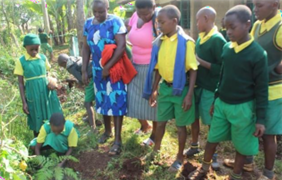
Here are recent updates on these three objectives.
Reforestation
In Vihiga, Kenya, tree nurseries of Grevillae trees were planted by ten farmer groups. The goal is to plant 3,000-4,000 trees in the upcoming planting season. The Grevillae provides leaves for pest and disease-free mulching. It is also a tree that grows quickly and has no negative impact on growing crops nearby.
In Tharaka Nithi, Kenya, 60 active resource persons are committed to being role models in farming communities by planting five trees annually (300 new trees total).
In West Pokot, farmers were trained on tree seed propagation and how to grow trees as a sustainable source of income.
In Burundi, farmers were trained on their role in ensuring reforestation. Each agreed to establish a nursery with tree seedlings distributed to them.
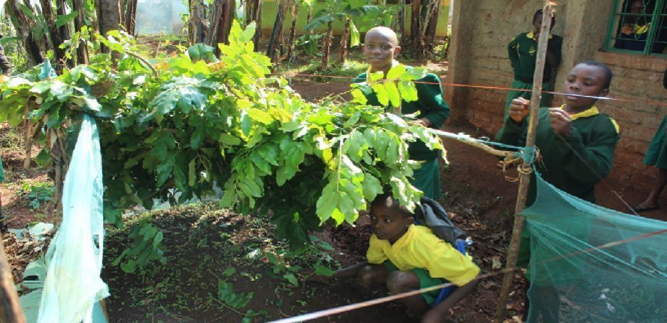
Soil conservation
Along with the reforestation efforts, farmers at each location are learning the importance of soil testing prior to growing their crops. Results from the soil tests are interpreted by professionals and farmers are advised on what nutrients are present or lacking in their soils. This is a cost savings for farmers, and allows them to focus on applying what the soil requires through nutrient-rich compost manure. This activity also reduces the chances of soil degradation and improved crop productivity.
Promote renewable, clean cooking energy
The OAIC and community partners are providing bio-digesters to promote affordable renewable energy technologies by households. Bio-digesters create renewable cooking gas through the waste of livestock and a source of organic farming compost. The gas produced is non-polluting and minimizes the greenhouse effect.
Next steps
The next steps of the project include planting 38,000 trees in Tharaka, Vihiga, West Pokot, Burundi, Uganda, and Tanzania. While the project still hopes to include schools and children in the process of planting trees, the OAIC anticipates this will be possible again with the resumption of a normal academic calendar for 2022-2023. Also during the upcoming academic year, the OAIC seeks to support the creation of environmental clubs at schools to help drive the project. Additionally, in the upcoming year, the OAIC plans to deliver 10 bio-digesters across the region to mitigate dependence on fuel, wood, and other energy sources that are exacerbating negative climate impacts.
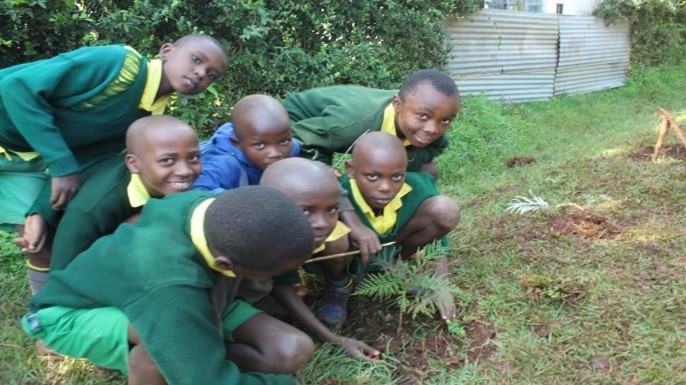
Support this Ministry
To make a gift for this ministry online or by check use the online donation page.
- 100% of your gift will be directed to OAIC Tree for Life Project
- You will receive updates on the work in this area as they become available
- Share in the vision of God’s abundant life for all people
Related Content
Global Ministries is Saddened to Learn of the Death of Dr. Gene Johnson
Dr. Gene E. Johnson died April 2, 2025, at age 96 at the Seminary Village, Galesburg, IL. He...
Read MoreReligious Leaders in Sierra Leone Urged to Hold Government Accountable on Public Debt Accumulation and Management
Originally shared here by the All Africa Conference of Churches. The All Africa Conference of...
Read MoreKushe o from Freetown, Sierra Leone
Written by KC King, Global Mission Intern with the Council of Churches of Sierra Leone Kushe o...
Read More
